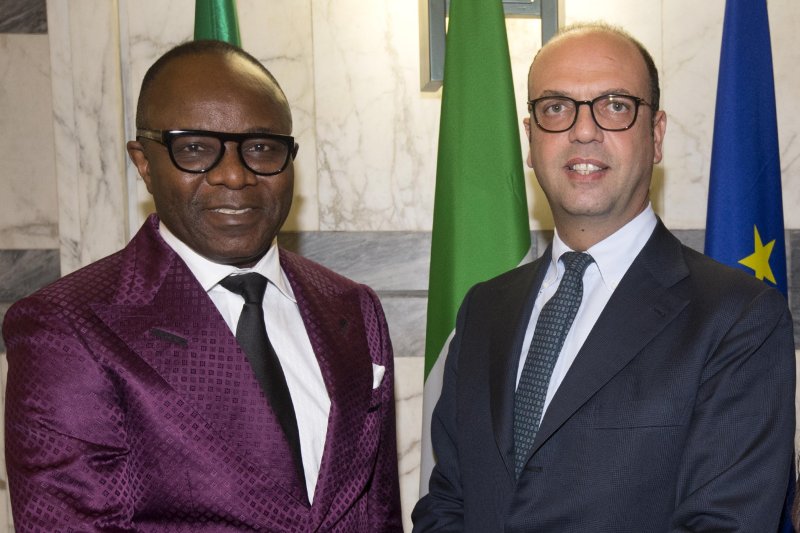Nigerian oil minister, Ibe Kachikwu, projects that Nigeria may increase output by about 60 percent within two years. Kachikwu (L) is shown here during a visit to Italy in January 2017 as he shakes hands with Angelino Alfano, then minister of Foreign Affairs but who left office in June. Photo by Claudio Peri/Epa
Dec. 14 (UPI) -- Ibe Kachikwu, Nigeria's oil minister, said the West African country's oil production may rise 60 percent by 2020, as the offshore Egina project comes online and as the country invests to recover output, in parallel to efforts to fight alleged bribing corruption involving two oil multinationals.
"If we work hard enough by the end of 2019, and 2020, we ought to begin to see Nigeria's production rise from the usual 1.8 million to 2.0 million barrels, up to between 2.5 million and three million barrels," Kachikwu said, as reported Friday by Nigeria's newspaper Vanguard.
"The increase is based on the coming on stream of the Egina field and the recently approved 30 field works which have the capability of increasing Nigeria's output by 500,000 barrels per day," he added in comments made Thursday in Abuja during a presentation of the oil ministry's work in the past three years.
According to France-based Total, which is the operator of the mile-deep offshore Egina project in which it has a 24 percent stake, the field would produce 200,000 barrels of oil per day. Drilling started in 2014, when production had been projected to begin by late 2018.
Besides Egina, there is also a contribution from recently approved works in "30 fields which have the capability of increasing Nigeria's output by 500,000 barrels per day," he added.
According to the latest OPEC report, which cites secondary sources, Nigeria's crude oil November production was 1.74 million barrels per day, down 30,000 barrels per day from October.
OPEC also published official data supplied directly by the country indicating output had actually increased 303,000 barrels per day during November to 1.9 million barrels per day, up from 1.6 million barrels in the previous month. OPEC uses secondary data for countries it follows to better approximate realistic figures.
According to information from the United States' Energy Information Agency Nigeria reached production levels of 2.5 million barrels per day in 2005, which declined to 1.7 million barrels per day within four years. It was only able to recover output to about 2 million barrels per day at some points between 2010 and 2012, before falling below 1.5 million barrels per day in 2016.
Kachikwu also said that problems in Nigeria related to scarcity of refined fuel could be solved through securing help from private investors so that refining operations could receive badly needed capital investment.
In addition to declining output and refining issues, the country has also dealt with corruption involving former oil minister Dan Etete and two majors.
In September, an Italian court convicted two people in relation to a Nigeria oil corruption case in which there were suspicions that over $1 billion in bribes were paid to help Eni and Shell gain rights to an offshore block that holds nine billion barrels of crude, according to a Vanguard report at the time.
Eni and Shell have denied any wrongdoing, the report said.
Another report by NGO Global Witness shows Nigeria has been seeking since late 2017 to prosecute those responsible over the alleged $1 billion bribing involving Eni and Shell.
Nigeria filed a lawsuit in November 2017 against investment banker J.P. Morgan, as it claimed it was negligent because it allegedly helped channel $875 million to an alleged front company owned by the former Nigerian oil minister, the same person who allegedly helped award the oil concession while in office.
The press release said at the time that J.P. Morgan considered the allegations unsubstantiated.
Global Witness is an NGO established in 1993 to work to break the links between natural resource exploitation, conflict, poverty, corruption and human rights abuses worldwide, according to the organization.















